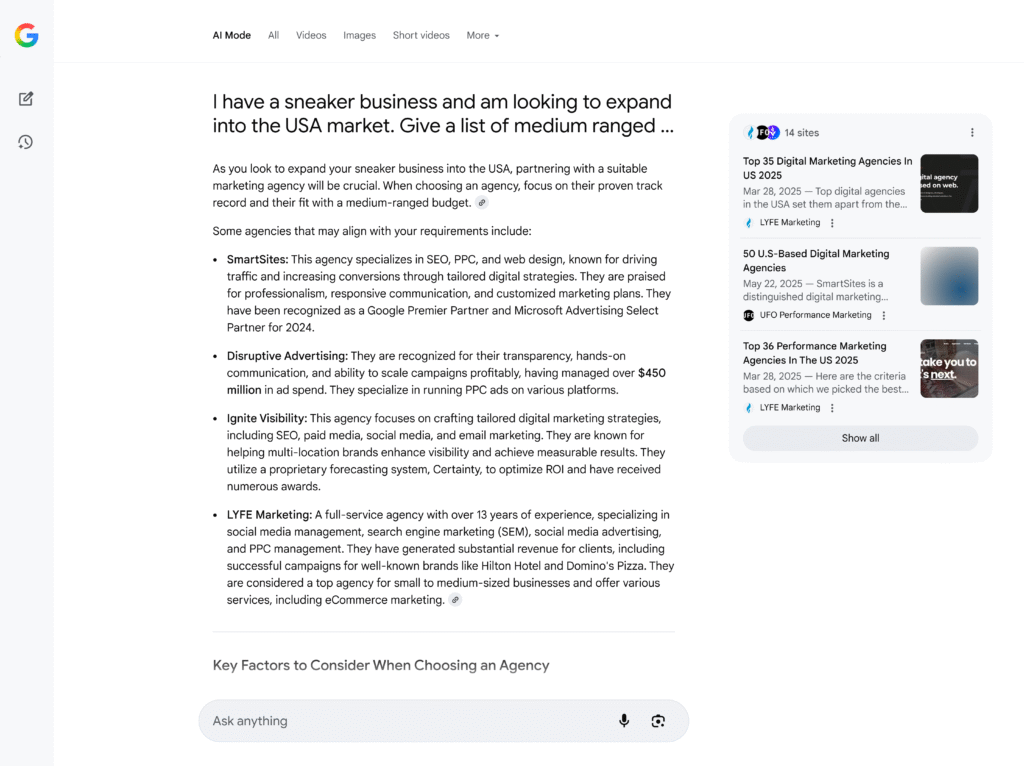The search landscape is transforming dramatically as we move deeper into 2025. AI-powered search platforms like ChatGPT, Google’s AI Overviews, and Perplexity are changing how users discover information. Instead of sifting through search results, users now receive comprehensive, AI-generated answers. This shift demands a new approach: Generative Engine Optimization (GEO). Unlike traditional SEO that focuses on ranking in search results, GEO ensures your content appears within AI-generated responses themselves. As generative AI continues reshaping search behaviors, mastering these best practices will determine which brands thrive in this new reality.
Generative AI research and analysis
GEO keyword research
In 2025, keyword research requires a fundamental rethink. Traditional SEO rewarded precision and repetition, but generative engines prioritize content that’s well-organized, easy to parse, and dense with meaning. GEO keyword research means understanding that queries are now longer (averaging 23 words versus traditional search’s 4) and sessions are deeper (averaging 6 minutes). Users interact with AI conversationally, asking follow-up questions and exploring topics thoroughly. ChatGPT alone receives more than 10 million queries daily, surpassing Bing in visitor volume.

Google AI Mode
AI Overview response analysis
Success with GEO requires analyzing how AI tools respond to queries in your niche. Test how your brand appears in AI-generated answers and identify patterns in what content gets cited. Google’s AI Overviews now appear on billions of searches monthly, accounting for at least 13% of all queries. Recent data shows an 800% year-over-year increase in referrals from LLMs, highlighting the growing importance of visibility in AI-generated responses.
Competitor research and analysis
Understanding how competitors appear in AI-generated responses gives you critical insights for your GEO strategy. Many AI responses are taken verbatim from corresponding Google search results, meaning top-ranking content often gets prioritized in AI answers too. Analyze which competitors consistently appear in AI responses for your target queries, then examine their content structure, information density, and citation patterns to identify opportunities.
Brand perception intelligence
How AI platforms represent your brand directly impacts user perception. Over 50% of AI-generated responses in 2024 cited content from the top 10 organic search results. This makes securing positive brand mentions across high-authority sites essential for controlling your narrative in AI responses. Without active management, your brand risks being misrepresented or overlooked entirely.
Technical optimization for AI accessibility
Technical optimization for AI accessibility
Make your content accessible to AI crawlers by implementing llms.txt files (similar to robots.txt but for AI crawlers), adding comprehensive structured data, and reducing reliance on client-side rendering. Organize content with clear headings, tables, and lists that make information easy for AI to parse. As AI Overviews now appear in over 55% of Google searches, these technical optimizations directly impact your visibility in both traditional and AI-driven search.
Proven generative engine optimization best practices
Train content pipelines using SEO-friendly Gen AI models
Leverage AI to create content that resonates with other AI systems. Focus on conversational styles, AI-friendly keywords, and structured content formats. When training AI models for content creation, prioritize:
- Factual accuracy
- Comprehensive coverage
- Clear attribution signals
- Structured data integration
Include AI validation steps in your content workflows
Before publishing, validate how AI platforms interpret and cite your content. Zero-click searches now make up over 60% of total searches, meaning users often consume information directly from AI responses without visiting source websites. Implement regular testing of how generative engines interpret your content by running sample queries and analyzing the responses to identify misrepresentations or citation gaps.
Use prompt engineering to drive search visibility gains
Strategic prompt engineering helps optimize how your content appears in AI responses. By understanding the patterns AI uses to extract information, you can structure content to maximize citation probability. Traditional search engine volume is projected to drop 25% by 2026 according to Gartner, making prompt engineering essential for maintaining visibility.
Boost SEO outcomes with generative AI for SEO tools
Select Gen AI SEO tools designed for post-2025 algorithms
The right AI tools can significantly accelerate your GEO strategy. With 89% of B2B buyers now using AI platforms like ChatGPT for research [Search Engine Journal], tools that optimize for AI visibility directly impact business outcomes. Prioritize solutions that monitor citation gaps, track brand mentions across AI platforms, and provide actionable recommendations.
Automate SERP-style and query-based content for faster wins
Create content that mirrors successful SERP features like featured snippets, FAQs, and knowledge panels that generative engines frequently cite. As ChatGPT processes over 2 billion queries monthly, automating content creation for high-volume queries can significantly expand your citation opportunities. Focus on comprehensive, factual content that directly addresses user questions.
Pair human editing with LLM-generated drafts for reliability
While AI tools accelerate content production, human oversight remains essential for ensuring accuracy and brand voice consistency. Smart brands understand that generative search engines often provide more contextual, detailed recommendations than traditional search results. Implement a workflow where AI creates initial drafts optimized for generative engines, then human editors refine messaging and add subject matter expertise.
Conclusion
As we navigate the evolving landscape of search in 2025, generative engine optimization best practices have become essential rather than optional. The strategies outlined here provide a roadmap for visibility in this AI-dominated search environment. By embracing these approaches, brands can ensure they don’t just appear in search results but actively shape the AI-generated answers that increasingly determine user perception and decision-making. The organizations that adapt fastest to these changes will gain significant competitive advantages as traditional search continues giving way to generative AI platforms.
FAQs
What are the top generative AI tools for SEO success in 2025?
The most effective tools for generative engine optimization in 2025 include citation gap analyzers that track brand mentions across AI platforms, prompt testing tools that simulate how different AI systems interpret your content, and comprehensive monitoring solutions that track performance across both traditional search and AI-generated responses. Look for integrated platforms that provide actionable recommendations rather than just data.
How can businesses train better prompts for SEO content?
Effective prompt engineering starts with understanding the query patterns in your industry. Analyze the types of questions users ask, then create content that directly addresses these queries with comprehensive, factual information. Structure content with clear headings, lists, and tables to make information extraction easier for AI systems. Test your prompts across multiple AI platforms and continuously refine based on performance data.
What mistakes to avoid when using generative AI for SEO?
The biggest mistakes include relying entirely on AI without human oversight, focusing exclusively on traditional SEO metrics while ignoring AI-generated responses, neglecting technical accessibility for AI crawlers, creating shallow content that fails to demonstrate expertise, and treating GEO as completely separate from traditional SEO rather than an extension of existing best practices.

Ridam Khare is an SEO strategist with 7+ years of experience specializing in AI-driven content creation. He helps businesses scale high-quality blogs that rank, engage, and convert.



